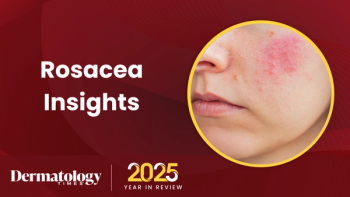
- Dermatology Times, December 2020 (Vol. 41, No. 12)
- Volume 41
- Issue 12
Age influences choice of rosacea therapies
A recent study conducted by the National Rosacea Society reveals more rosacea patients are satisfied with their treatment, but highlights the need for treatment option awareness among older patient populations.
Most patients with rosacea are satisfied with the current oral and topical prescription therapies they are using to treat this skin condition, according to a recently-published study from the National Rosacea Society (NRS). However, the data also reveal age-related trends in preferred therapies. According to survey results, patients 60 years and older are more likely to use older treatments instead of newer therapies, even if they are potentially more effective in targeting specific signs and symptoms.
Researchers surveyed 1,714 patients with rosacea. Of those patients, 54% of the 60-and-over population group report they are still using prescription therapies that were the first-ever developed and approved products for rosacea versus 41% of patients under 60. Additionally, survey results reveal 42% of patients 60 and over with rosacea continue to use their same treatment regimen versus 19% of patients under 60.
“These findings suggest that older patients should talk with their doctors about newer therapeutic options,” says Linda Stein Gold, MD, director of dermatology clinical research at the Henry Ford Health System. “Rosacea is now understood to include a variety of possible combinations of signs and symptoms, and there is currently a range of medical therapies that will address them individually,” she adds. “In addition, taking more than one medication as prescribed may have a synergistic effect to achieve more successful results.”
Survey results also show differences in treatment between older and younger rosacea patients stretched to various other therapies.
The NRS survey reports patients younger than age 60 are more than twice as likely to use topical ivermectin (Stromectol, Merck; Soolantra, Galderma) when compared with patients 60 and over (20.7% versus 91%), as well as 5 times more likely to use topical oxymetazoline (Rhofade, EPI Health) (6.9% versus 1.4%). Meanwhile, both age ranges regularly use a prescription formulation of azelaic acid foam (Finacea, Leo Pharma), with 15.1% of patients under 60 and 13% of those 60 and over, respectively. Respondents had the option of selecting multiple treatments. Results show 22% of surveyed patients use over-the-counter products.
Results also show topical metronidazole to be the most commonly used past treatment, with 56% reporting past usage. Meanwhile, 40% report past usage of prescription doxycycline tablets or extended release capsules, and 22% having used prescription azelaic acid foam.
Of patients with patients who changed treatments, 28% attribute the switch to dissatisfaction with previous treatment results, while 23% say a medical professional prescribed a new treatment. Also, 9% report a change in treatment because their insurance no longer cover the product.
Data also reveal that 69% of respondents would consult their dermatologist about a different or new treatment option that they thought would possibly help their rosacea.
According to the NRS, rosacea can develop in a variety of ways and can be onset at any age. However, data from patient surveys show that the skin condition commonly presents itself after age 30, thus leading to increased prevalence and population impact in older age groups.
“Today’s approach to rosacea treatment is different than in the past, when there were few options in our tool kit to address the variable signs and symptoms that may be present in an individual case,” Stein Gold notes. “Now that there are effective therapies available to combat each sign and symptom, it is possible to tailor treatment to the needs of each patient.”
The NRS survey asked respondents to rate their satisfaction with their treatment results on a scale of 1 to 5, with 5 being the most satisfied. Patients report overall satisfaction with their results no matter what treatment option they were utilizing, according to the NRS data. Nearly all had weighted average satisfaction scores of 3.5 or higher and no respondents reported below a 3.
Approximately 56% of patients with rosacea report clear or almost clear skin on most days-- 30% with mild rosacea, 12% with moderate and 1% severe, respectively.
“It’s important that patients follow directions on exactly how and when to apply each medication and use it consistently. Rosacea can often be successfully kept at bay, especially if patients take the medication exactly as prescribed,” says Stein Gold. “Not only will a partnership between a patient and their doctor produce the best results, appropriate management may help slow progression of the disease as well as maintain remission.”
The survey also touched on the impact of the COVID-19 pandemic on rosacea treatment, with 56% of respondents reporting they consulted a dermatologist regarding their skin condition within the past year while 18% report seeing a physician within the past three years. When asked about teledermatology, 15% of the patients surveyed used the service and would use it again while 40% have not used it but are considering it.
Reference:
Rosacea.org. New rosacea survey shows most patients are satisfied with therapy, but more awareness of treatment options is needed.Accessed November 4, 2020.
Articles in this issue
about 5 years ago
Emerging therapies beyond lasersabout 5 years ago
Half of patients with AD satisfied with treatmentabout 5 years ago
Review links GI disorders, rosaceaabout 5 years ago
Dermatology Times celebrates its 2020 Giants of Dermatologyabout 5 years ago
Pandemic Lessonsabout 5 years ago
Age discrimination in the era of COVIDabout 5 years ago
Adolescent acne therapies benefit younger childrenabout 5 years ago
JAKs may predict psoriasis riskabout 5 years ago
Study links vitamin D deficiency with acneabout 5 years ago
Puzzling PRP possibilities and dermatologyNewsletter
Like what you’re reading? Subscribe to Dermatology Times for weekly updates on therapies, innovations, and real-world practice tips.











